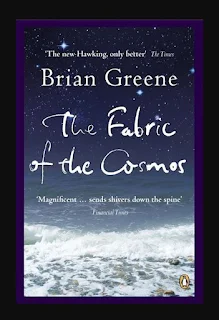The Fabric of the Cosmos
by
Brian Greene
Reviewed by
Geoffrey W. Sutton
I suppose my fascination with science began
in childhood when the Russians first sent a rocket into space. I was fortunate to
have a workbench in our basement where I messed with various science kits and
old radios. Soon, I would be fascinated by High School science classes and the
opportunity to build a simple computer. Although my path led to psychological
science, I still enjoy reading the nonspecialist versions of the Big Picture
like Greene’s The Fabric of the Cosmos.
The Fabric of the Cosmos by Brian
Greene is known for discussing several mind-bending concepts that challenge our
everyday understanding of reality. Here are some of the most thought-provoking
ideas explored in the book:
1. The Nature of Space and Time: Greene explores the fundamental structure of the cosmos,
questioning the very nature of space and time. He delves into whether space is
an entity and why time seems to have a direction.
2. Quantum Entanglement: The book discusses quantum mechanics and the phenomenon of
entanglement, where distant objects can instantaneously coordinate their
behavior, defying the classical understanding of space.
3. Teleportation: Greene touches on the concept of teleportation, a staple of
science fiction, but also a real scientific possibility under certain quantum
conditions.
4. Parallel Universes: The idea of parallel universes is another concept that Greene
examines. He discusses the possibility that every outcome of a quantum event
actually occurs, but in separate, parallel universes.
5. The Block Universe Theory of Time: This theory suggests that past, present, and future events exist
simultaneously, which challenges our linear perception of time.
6. The Fabric of Reality: Greene's exploration of string theory and the potential textures
of reality suggest that what we perceive is only a small part of a much larger
and more complex fabric.
These concepts push the boundaries of what
we consider possible and encourage readers to think about the universe in new
and different ways. Greene's ability to explain these ideas in an accessible
manner has made The Fabric of the Cosmos a celebrated work in popular
science. If you're intrigued by these topics, diving into the book will provide
a much richer understanding of these fascinating aspects of our universe.
Reference
Greene, B. (2004). The Fabric of
the Cosmos: Space, Time, and the Texture of Reality. New York, NY: Vintage
Books. Available on AMAZON
Cite this review
Sutton, G. W. (2024, April 30). The fabric of the cosmos-A Review. Interdisciplinary Book and Film Reviews. Retrieved from https://suttonreviews.suttong.com/2024/04/the-fabric-of-cosmos-review.html
About Brian Greene
Brian Greene is a prominent American
theoretical physicist and mathematician known for his work on string theory and
his ability to explain complex scientific concepts to the public. Born on
February 9, 1963, in New York City, Greene has made significant contributions
to the field of physics, particularly in the areas of superstring theory,
including the co-discovery of mirror symmetry and the discovery of spatial
topology change.
Greene's academic journey began at Harvard
University, where he graduated summa cum laude with a bachelor's degree
in physics in 1984. He then attended Magdalen College, Oxford, as a Rhodes
Scholar, earning his DPhil in theoretical physics in 1987.
He started his teaching career at Cornell
University in 1990, where he was appointed to a full professorship in 1995. The
following year, Greene joined the faculty of Columbia University as a full
professor, where he has been ever since. At Columbia, he is co-director of the
university's Institute for Strings, Cosmology, and Astroparticle Physics
(ISCAP) and has been involved in research applying superstring theory to
cosmological questions.
Geoffrey W. Sutton, PhD is Emeritus Professor of Psychology. He retired from a clinical practice and was credentialed in clinical neuropsychology and psychopharmacology. His website is www.suttong.com
See Geoffrey Sutton’s books on AMAZON or GOOGLE STORE
Follow on FACEBOOK Geoff W. Sutton
You can read many published articles at no charge:
Academia Geoff W Sutton ResearchGate Geoffrey W Sutton

Comments
Post a Comment